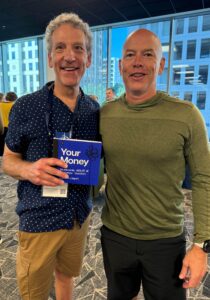How to Spend for Greater Fulfillment
Financial planning is about more than saving and investing for tomorrow. For many, the biggest long-term goal relates to maintaining your quality of life in retirement. But you don’t want to overlook other stages of your life. As you work towards long-term goals, it’s important to use your money in ways that make every stage of your life more comfortable, fulfilling, and fun.
But, as study after study has shown, filling up your closets and garage with more stuff probably isn’t going to make you happier about life or your money. Shopping, like social media “Likes,” can release an addictive hit of dopamine in your brain. It can make you feel good in the moment. Unfortunately, that feeling fades quickly. Chasing the next burst of happiness from one spending spree to another can create anxiety around managing the things we’re accumulating AND the financial resources we’re depleting.
Planning more of your spending around the following four things can create a healthier relationship with your money and help you live your most fulfilling life.
Time
Could you complete your tax forms by yourself? Sure. Would you enjoy it and do the best job possible? Probably not. That’s why you collect your financial documents every year and visit your financial advisor and CPA. Not only does paying a pro save you time, but a CPA may find things you might otherwise miss and, potentially, save you money as well.
There are almost certainly other tasks in your life you’re doing out of habit, not because you enjoy doing them or have the professional skills to do them well. What could you do with the week that you don’t spend painting your house through gritted teeth? How much more enjoyment will you get out of your porch renovation if it’s done right the first time? How much more time could you spend with your family if let someone else cut your lawn? For me, letting someone else cut our lawn saved over three hours every week. When I made that switch, the cost was less than $15 per hour, too. Time with family is much more valuable than that.
Other People
Researchers have consistently concluded that spending money on other people is more rewarding than spending on ourselves. Giving combines the happiness we experience when we spend with the fulfillment of making a difference in someone else’s life or impacting a cause that’s important to us. A recent study even associated higher levels of happiness with “passive spending” – automatic giving that freed folks from feeling uncertain or regretful. Pledging automatic monthly donations to your charity of choice might create a similar, sustained feeling of satisfaction.
Or the next time you feel the urge to splurge, buy something nice for a loved one, either because they need it or just to show them you care.
Daily Delights
Even if you have the financial means, you probably can’t go on vacation every day. But that doesn’t mean you can’t reward or surprise yourself in ways that brighten your daily grind. Try a new lunch spot. Take a long walk after work. Treat your kids to ice cream on the way home from soccer practice. Skip out of town for a long weekend with your spouse. These small indulgences can help you to slow down a little and appreciate all that you have and the people whom you share it with.
Big Experiences
It’s never too early to start tackling your bucket list. After all, planning for a dream vacation creates anticipation. It can also make the waiting and the experience itself more worthwhile, especially if you arrange for loved ones to join you.
Including future experiences as part of your Goals for Life can also help you keep your long-term and short-term spending in sync with the rest of your Life Plan. Let’s talk about how you’re feeling about your spending plan and some ways you can get more from your money than just more money. You can schedule an appointment where we can talk about the resources available to you and how you can get more out of your life throughout the year.
This Week’s Favorite Reads
In this week’s favorite reads, we remind you to periodically revisit your will and offer suggestions to improve your focus. You will also find articles discussing why women over age 50 may prefer renting rather than buying, the potential mental health hazards of ultra-processed foods, and some tips to help you spend smartly.
Here are the links to this week’s articles as well as a brief description of each and why you should check it out:
1. 10 Good Reasons to Revisit Your Will.
Some people have an aversion to drafting their will. They don’t want to think about their death. But it’s important. We’ve all read stories about famous people like Prince who did not have a will at the time of their death. Not having a will makes things so much tougher for your loved ones. It can also make asset transfers more expensive. Guess what? Wills are not a one-and-done task. Life changes as you age. Your children get older. Your marital status could change. Your attorney might retire. Perhaps your trustee or executor is no longer available. Your assets will change, too – hopefully for the better! This article shares 10 reasons to revisit at your will every three to five years. Doing so can ensure that everything from beneficiaries to law changes are properly reflected.
2. How to Train Your Brain to Deal With Distractions, Learn to Concentrate, and Refind Your Motivation.
Do you have trouble focusing? Whether you work in an open office, or the comfort of your home, distractions, and your own brain can keep you from focusing. According to a study cited in the article, people spend almost 47% of their day thinking about something other than what they’re doing. Think about how much more you could accomplish if you could increase your focus. The article talks about four types of attention. Focused attention represents the best kind. It happens when you are highly engaged and challenged by what you’re doing. Rote attention occurs when you are highly engaged but don’t find the work challenging. You want to avoid the other two types – boredom and frustration. The article offers suggestions to help you improve your focus and find motivation in your work.
3. The Allure of Apartment Life: Here are some reasons why renting may be smarter than buying for single women over 50.
The rent vs. buy decision gets complicated, especially for women over 50. Many face divorce, an emptying nest, the death of a loved one, and other life events. This leaves them contemplating their long-term home situation. Sometimes affordability plays a big role in the decision. But there’s more to it than that. After all, 30% of adults aged 55 and older live in rented accommodations, the most since 1965. The article reviews the pros and cons of living on your own. In the end, it’s important to weigh the risks and rewards and make the best decision for you and your life plan. It can also make sense to rent for a year or two while you decide where you want to live long-term.
4. The New Science on What Ultra-Processed Food Does to Your Brain.
Life can get crazy. You get tired. You want a snack but don’t think about eating fresh fruit or veggies. Instead, you settle on ultra-processed foods like chips, many cereals, and most packaged snacks. You can find them at the grocery store. Eating some of these foods can become addictive. Scientists are proposing a new mental health condition called “ultra-processed food use disorder.” Filling your diet with too many of these foods can raise the risk of sleep problems, too.
5. 8 Ways to Spend Smartly.
Many view budgeting as a four-letter word. You want to at least be mindful about where your money goes. Pay attention to those monthly and annual charges that hit your credit card statements. Make sure you still use the subscriptions you pay for. If not, cancel them. Turn off auto-deliveries of items that you receive too often as well. Spending smartly can help you create some room in your budget. It can help you stop living paycheck-to-paycheck, too. Remember that it’s not only about spending smartly. It’s also about saving wisely. If you’re not sure how to start saving, consider paying yourself first.
Bonus: Here’s How Difficult It Is to Steer a Ship Under a Bridge + The Frantic Calls to Halt Baltimore Bridge Traffic Before Ship Crash.
I’ve published many “Apprise’s Five Favorite Reads” blogs over the last several years. I keep them to five articles and like the structure. But I’m adding these two this week because of what happened in the nearby port of Baltimore last week. A ship collided with the Key Bridge and a huge chunk of the bridge immediately crashed in the water. When I first read about this, I assumed the worst about the captain and his crew. It turns out that they did all they could under the circumstances. They radioed to shore and had traffic shut down. The ship lost power. Little could be done to steer the ship.
While a loss of life is not something to take lightly, it could have been much worse than the six who are assumed to have died in the incident. I don’t know how long it will take to rebuild the bridge – it took five years to build it. Other ports have offered to help with the flow of goods, as this could also cause supply chain disruptions.
Our practice continues to benefit from referrals from our clients and friends. Thank you for your trust and confidence.
If you would like to talk to us about financial topics including your investments, creating your life plan, saving for college, or saving for retirement, please complete our contact form or schedule a call or a virtual meeting via Zoom. We will be in touch.
Follow us:
Please note. We post information about articles we think can help you make better money-related decisions on LinkedIn and Facebook.
For firm disclosures, see here: https://apprisewealth.com/disclosures/




